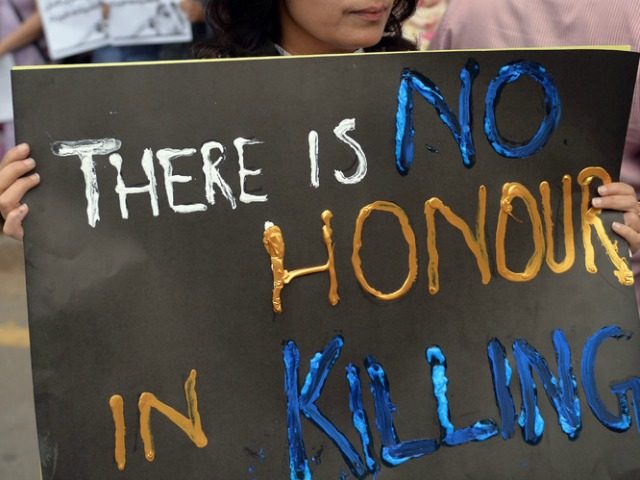The legislature of Pakistan has passed a law that prevents the families of victims of “honor” killings from officially forgiving the killers, previously undoing a legal loophole that has allowed many murderers to go free. The law also makes it illegal to rape minors or disabled individuals, and makes DNA testing in rape cases mandatory.
The legislature passed the law Thursday, a bill drafted in March but resubmitted following the honor killing of Internet celebrity Qandeel Baloch, whose brother “proudly” strangled her after she exposed a respected Islamic mufti for allegedly making sexual advances towards her.
The bill eliminates a provision that had made convictions of murderers in cases of “honor” – murders of women deemed to have tarnished the family image through some perceived violation of Sharia law (in Pakistan, though “honor” killings by Hindus also occur in India) – nearly impossible. Before, families could tell police that they forgive the murderers, and thus bar law enforcement from prosecuting the case. Before 2005, men who killed a female relative could use this provision to pardon themselves, as they were considered members of the family.
Parents still retain one veto over the court system, however: if a murderer is sentenced to the death penalty, the family of the victim may forgive them, triggering a 12.5-year “life sentence” instead of capital punishment.
The rape of minors and disabled individuals who do not have the ability to consent was previously not a crime in Pakistan. Most cases also suffered from a lack of evidence, as DNA testing was not mandatory. The Pakistani newspaper Dawn notes that this set of circumstances has resulted in rape conviction rates at “close to zero percent, largely due to the law’s reliance on circumstantial evidence and a lack of forensic testing.”
The new mandatory minimum sentence in a rape case is 25 years.
The bill faced some opposition in the legislature. Rather than argue against the bill, one representative argued against debating bills at all, blaming India and “the Jewish agenda” for the smooth operation of the legislature on Thursday.
“This Parliament has been subdued by the American NGOs and their Jewish agenda, which is against Pakistan,” Dawn says in a summary of his statements. “He also lamented that ‘today even 5th graders are aware of sex education.’”
Pakistani Prime Minister Nawaz Sharif celebrated the bill. “Women are the most essential part of our society and I believe in their empowerment, protection and emancipation so that they can equally contribute towards development and prosperity of our country,” he said in a statement following its passage.
Qandeel Baloch gained international acclaim for daring to defy strict Islamic norms of how women should behave. Dubbed “Pakistan’s Kim Kardashian” for her posts on social media – tame by Western standards, but scandalous in Pakistan – Baloch began her career by posting photos of herself online, but rapidly began to advocate for female independence and against the imposition of traditional Islamic values on women.
Baloch drew controversy shortly before her death by meeting the cleric Mufti Abdul Qavi in a hotel room in June and taking a “selfie” photo with him. Qavi was demoted from his positions on various Islamic committees as a punishment for his inappropriate meeting with the Internet star. Baloch, meanwhile, said on her Facebook page that she had seen Qavi enjoy a soda in her presence – during the day, during the Ramadan fast – and that he had made sexual advances towards her, which she rejected.
She immediately began receiving death threats and asked Pakistani police for further security.
In July, her brother Waseem strangled her. She was 26.
“I am proud of what I did,” Waseem told the press after his arrest. “Girls are born to stay home and follow traditions. My sister never did that.”
Baloch’s mother told the media her son had spoken to Qavi after the incident, and she believed the cleric encouraged Waseem to kill his sister.
Baloch’s parents have refused to forgive their son, which would absolve him of any crime. As a result, they have faced significant pressure from their community. As Qandeel was the only member of the family generating any income, the septuagenarians are now homeless, the father ill with tuberculosis and missing a leg. None of their seven sons have come to their aid after Qandeel’s murder.
The Pakistani newspaper Dawn has published a column condemning such community pressure and urging the legislature to act not only against those who physically murder, but enablers, as well, to prevent not only murders, but suicides:
The girls who become victims of these crimes are the bravest and sturdiest of the lot.
Far greater numbers kill themselves out of hopelessness and haplessness, driven to death by the oppressive demands of the men who they know can and will kill them.
Their deaths are not counted in the numbers of honour crimes, fractional figures of a reality too grim to count.

COMMENTS
Please let us know if you're having issues with commenting.